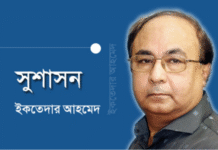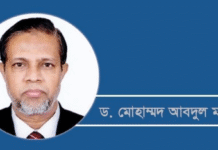By
Turkey’s decision to send a ship to rescue Rohingya at sea is another instance of Turkish soft power at work. Turkey has been playing an increasingly visible role in relief operations in other parts of the world, projecting itself as a benevolent Muslim power and earning the trust of non-Turkish Muslim communities.
By Farish (Badrol Hisham) Ahmad-Noor*
As the nation-states of the ASEAN region work to find a solution to the Rohingya exodus across the waters of Southeast Asia, a non-ASEAN country has joined in the effort: Turkey. On 19 May 2015 Prime Minister Ahmet Davotuglu announced that a Turkish battleship was on its way to the region, with the intention of rescuing Rohingya who may be lost at sea; while working with the International Organisation for Migration, whose deputy chief of mission is based in Jakarta, Indonesia.
That Turkey has decided to involve itself in the Rohingya issue is interesting both in terms of its timing and the manner in which it has chosen to involve itself. It ought to be noted that Turkey’s contribution has come in the form of a ship whose mission it is to intercept and rescue Rohingya out at sea. At no point has Turkey addressed the internal political crisis in Myanmar itself which has led to the exodus of Rohingya from the country, and has thus far not issued any critical statements to blame any parties or actors for the Rohingya exodus in the first place. Rather than dealing with the political problem in Myanmar, it has focused its attention on the Rohingya exodus out at sea.
Turkish humanitarian relief not new
For more than a decade now Turkey has projected itself abroad through humanitarian relief. Some of these Turkish operations have been on a large scale, and very well managed from start to finish; earning the country the respect of the communities it has helped. It is important to note that this new initiative is not the first time that Turkey has lent a hand in relief operations in Southeast Asia; the last time it played such a visible role was in the relief operation in Aceh, North Sumatra, following the Indian Ocean tsunami of 2004.
In 2004 the Turkish relief effort in Aceh following the tsunami was one of the best-publicised, and well-received by the Acehnese themselves. In the course of my interviews with local Acehnese then, it was noted time and again that the Acehnese were happy that a Muslim state had come to their aid in times of crisis, and many Acehnese recollected old historical accounts of the long-standing links between the Kingdom of Aceh and the Ottoman Empire of the past.
Not only was the Turkish relief effort well managed in terms of logistics and deliverables, the Turks were also able to harness the collective memory of many Acehnese for whom the legacy of the Ottoman Empire was a positive thing, notably in the way that the Turks had once assisted the Acehnese in their struggle against colonial rule.
Another interesting observation I made then was the immense popularity of the Turkish flag, which bears an uncanny resemblance to the flag of the Free Aceh Movement – Gerakan Aceh Merdeka (GAM) – which had been banned by the Indonesian authorities. Many Acehnese were eager to get the Turkish flag, and many homes displayed it proudly.
Turkish soft power at work
Later in 2005 I was also present at another Turkish relief operation, in Kashmir, following the massive earthquake that took place there. Again, the Turkish operation was very well managed: The Turks delivered not only medicine and supplies, but also brand-new clothes that had been donated by Turkish clothes manufacturers.Turkey was then a major producer of high-street fashion clothes and accessories, as many Western companies had relocated their production to Turkey due to lower costs and high quality standards.
As in Aceh, the Kashmiris I met praised the Turks – as well as the Chinese delegation – above all others. The Turks gave out free medicine, brand-new clothes (as opposed to second-hand donations from other countries) and were also fellow Muslims. The cultural and political affinity between the Turks and the Kashimiris – and the Acehnese – provided a crucial bonding factor that other Western aid agencies did not have.
Turkey’s decision to send a ship to rescue the Muslim Rohingya in the waters of Southeast Asia should thus be seen as another instance of Turkish soft power at work, where the delivery of medical aid and humanitarian assistance – particularly to other Muslim communities in need – earns it the respect, recognition and kudos that would be the necessary result of sophisticated soft power politics in action.
That Turkey has decided to play a role in the Rohingya crisis now is thus not surprising, as it has been the policy of the Turkish government to pursue such peaceful soft power politics for more than a decade now. The material-economic costs to Turkey have been relatively low, but the dividends – in terms of international prestige, honour and even love for Turkey – have been high.
Unintended pressure on ASEAN?
Here it is important to note that Turkey has – so far – not rebuked or criticised the Myanmarese government for its treatment of the Rohingya, and has thus stayed out of the political conflict in that country. By doing so it has not antagonised the government of Myanmar in any way, but rather presented itself as a benevolent power that has come to the region not to intrude, but rather to save and rescue – a politically savvy posture that has incurred almost no political cost to its reputation in Asia.
Another – perhaps unintended – outcome of Turkey’s involvement is that it has upped the stakes in the Rohingya issue, and may perhaps compel other states in and beyond ASEAN to play a more proactive role in resolving the Rohingya problem. But even here the Turkish stance has been non-judgemental, and the Turkish prime minister has explained Turkey’s involvement in purely humanitarian terms, avoiding the pitfalls of realpolitik discourse. Thus this low-risk strategy seems to have been to Turkey’s advantage, bolstering its image without creating any enemies in the process.
*Farish A Noor is Associate Professor and Coordinator of the PhD Programme at the S. Rajaratnam School of International Studies (RSIS), Nanyang Technological University, Singapore.
Source: Eurasiareview











Where are our Saudi friends & the OIC ??
Saudis who call themselves Champions of Islam, are far from Islam, far from service to humanity.
They wud rather build a 7000 room hotel in Mecca & have it done by the Britishers & Americans !!
Shame on Saudis & the oil rich Arabs.